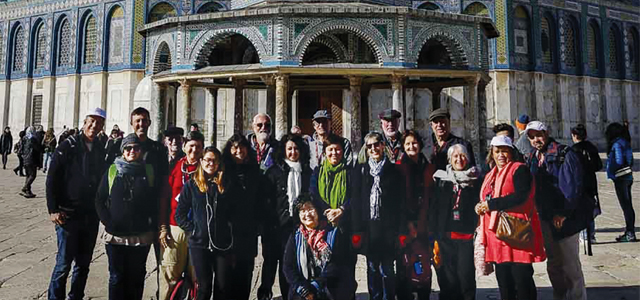The Palestinian-Israeli-Arab conflict is one of the most complex and unresolved disputes of the modern age. So, what could you and your Congregation possibly do to get involved with such a complicated international issue, so far away? A delegation from the Synod of NSW and the ACT visited this ongoing war zone earlier this year, to hear from people who live within the Israel/Palestine conflict. Hoping to learn about the peace process beyond politics, the tour gathered stories, experiences and organisations, which Congregations can engage with and support.
In a first for the Uniting Church in Australia, a study tour of Palestine and Israel included leaders within the UCA, as well as the NSW Jewish Board of Deputies (JBD) and the Inner West Chavara (a local Sydney Jewish group). The tour consisted of 22 people, 12 Jews and 10 Christians who all are part of the ongoing NSW and ACT Synod interfaith dialogue with the Jewish community in NSW.
The aim was to allow Jews and Christians to come together and spend equal time in both Israel and Palestine — offering various points of view, from inside the conflict. The hope was that the group might discern a pro-Palestine, pro-Israel, pro-peace perspective.
The study tour was the result of two years of dialogue between the Relations with Other Faiths (ROF) committee and the Jewish community about the issue of identity, peace, justice, anti-semitism, Islamophobia and the Israeli-Palestinian conflict. The group met with 55 high profile and grassroots speakers including Dr Rami Hamdallah, the Prime Minister of Palestine, and David Keyes, Spokesperson for the Prime Minister of Israel. But far from such political heights, the tour spotlit the role that grassroots programs can play in the peace process for Palestine and Israel. Going beyond media bias or political slogans, the tour heard stories from everyday people.
Read the article in Insights Magazine.

